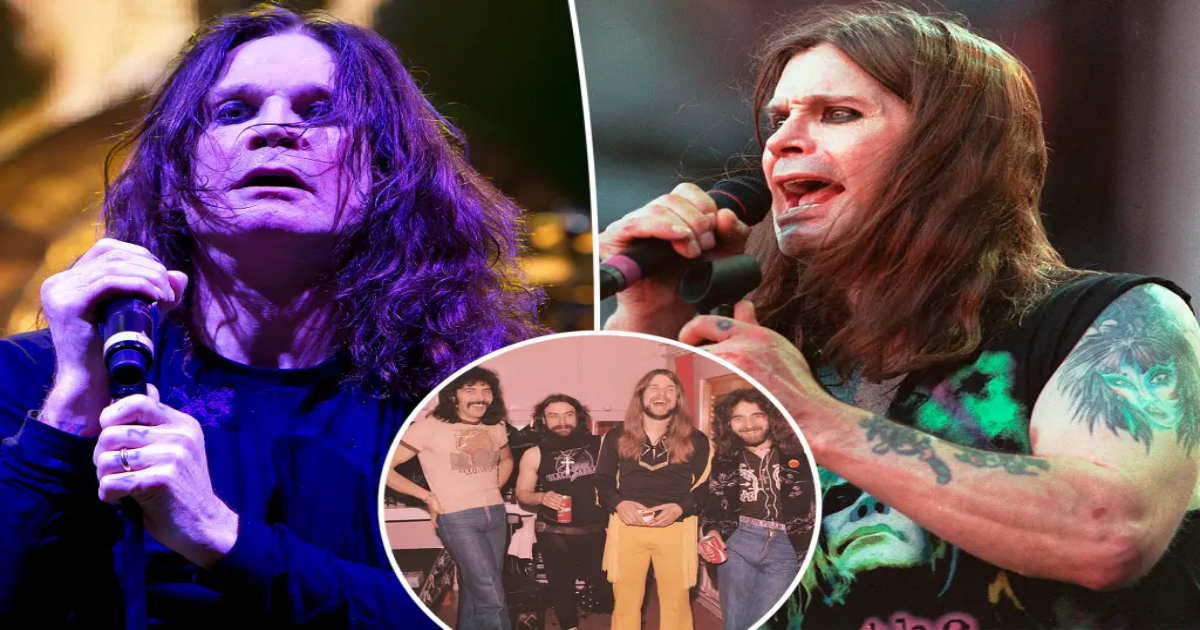Heavy metal is the musical genre most prone to hyperbole — “This one goes to 11,” as Spinal Tap said — but it’s no exaggeration to say metal would never have existed without Black Sabbath, and rock in general would have had much less roll without its singer, co-founder and indelible character Ozzy Osbourne.
Ozzy died Tuesday at 76, a little more than two weeks after he joined the other three original members of Sabbath onstage in their native Birmingham, England, for a farewell concert to benefit local children’s charities and Cure Parkinson’s, a disease he was diagnosed with in 2019.
Dressed as usual from head to toe in black, wild eyes shrouded with heavy liner, the self-proclaimed “Prince of Darkness” sang four of the band’s iconic songs while sitting on a throne, unable to prowl the stage as he did for decades. And afterward, his mates presented him with a cake.
Ozzy Osbourne performs with Black Sabbath at Ozzfest in 1997 in East Rutherford, NJ. AP
As fans overwhelmed Ozzy with waves of gratitude for more than half a century of sturm und drang, the incongruous but touching Hallmark moment contrasted with a band that eschewed sentiment in its music and lyrics, preferring to mine more sinister and ominous turf.
When Sabbath formed in 1968, the group took its name from a Boris Karloff horror movie. The members looked like Everymen who would have been bricklayers if they hadn’t stumbled on a unique formula that brought them stardom. And crazy/goofy Ozzy was far from the superstar frontman mold of a Robert Plant or Roger Daltrey.
Sabbath’s sound and aesthetic provided a stark contrast to the still-prevailing peace-and-love vibe, and every heavy band since that’s worn black and avoided love songs like the plague owes the group and Ozzy a debt.
Black Sabbath’s Geezer Butler, Tony Iommi, Bill Ward and Ozzy. WireImage
Though vilified by censorious types who portrayed him as the devil incarnate, Ozzy’s was always a brand of what writer Nick Tosches called “bubblegum Satanism.” To be sure, the music was undeniably heavy and cheerless, and the singer’s high-pitched yelp of a voice seemed to come from someone badly in need of an exorcism.
And, yeah, Ozzy did bite the head off a bat when he split from Sabbath and went solo, influencing a whole new generation of fans.
But as evidenced by his third career as a reality TV star on “The Osbournes,” Ozzy always gave us a wink so we’d know he was never taking the comic-book horror or himself too seriously. As for the bat, well, the excesses were something he admitted.
Ozzy’s final show with Black Sabbath in Birmingham, England, July 5. Ozzy Osbourne/Instagram
Ozzy’s final Instagram post one day before his death. Ozzy Osbourne/Instagram
“People say to me, if you could do it all again, knowing what you know now, would you change anything?,” he wrote in “Last Rites,” his second memoir, due for publication in October.
“I’m like, f–k no. If I’d been clean and sober, I wouldn’t be Ozzy. If I’d done normal, sensible things, I wouldn’t be Ozzy.”
In the end, as with every singular talent, it’s not the antics we should remember and celebrate, but the work. In particular, the first five Sabbath albums and Ozzy’s first two solo efforts are masterpieces as timeless and essential as any in rock history.
Ozzy performs with Black Sabbath at the PNC Bank Arts Center in Holmdel, NJ, in 2013. Chad Rachman/New York Post
The music is also a hell of a lot of fun. That may not be a word you associate with Ozzy, but if you doubt it, try to listen to “Sweet Leaf,” “Fairies Wear Boots” or “Crazy Train” without smiling, Turn ‘em up loud, and if you indulge, lift a pint to rock’s first and forever Dark Prince.
Long may he yelp at us from the great beyond.
Jim DeRogatis spent 15 years as music critic for the Chicago Sun-Times and is author of “Soulless: The Case Against R. Kelly.”
